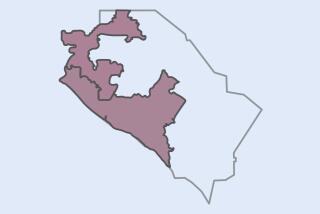Revised Districts Hinder Minorities, Critics Say
- Share via
SACRAMENTO — Minority community leaders demanded Wednesday that the Legislature abandon redistricting plans that would “slice and dice” the emerging political power of the expanding Asian American community in the west San Gabriel Valley.
Representatives of Asian American, Pacific Islander and Latino organizations zeroed in on the proposed “carving up” of Monterey Park, Rosemead, Alhambra and San Gabriel.
The comments came during the final day of public hearings on redistricting plans for the Assembly, Senate and Congress.
The bipartisan plans, which would protect incumbents and preserve the Democratic-dominated status quo in the Legislature and House, must be passed by Sept. 14 to take effect for the primary election March 7.
Asian American and Pacific Islanders are the fastest-growing minority in California and constitute 13% of the state’s population. There are now four Asian Americans in the Assembly--a record--but none in the Senate.
Since the early 1990s, the four valley cities have been united in a “community of interest” fashioned by the state Supreme Court for Assembly, Senate and House districts.
Kathay Feng, a Los Angeles attorney representing the Coalition of Asian Pacific Americans for Fair Redistricting, characterized the west valley region as the cultural and political heart of the Asian American community in Southern California. Only this year did the area manage to send an Asian American to the Legislature--Assemblywoman Judy Chu (D-Monterey Park).
The area, Feng testified, constituted the “gateway for a new generation of Asian American communities outside the enclaves of Chinatowns, Koreatowns and Little Tokyos.”
She endorsed the mostly unchanged Assembly boundaries for Chu’s 49th Assembly District, but attacked lines proposed for the area by Senate and House map makers.
The Senate plan, Feng charged, would carve up the area’s population and spin it off into four other Senate districts while the House map would divide it into three congressional territories.
She said the Assembly plan, which she called “a true balance of interests,” would maintain Latinos at 42% of the Assembly district’s population, while Asian American and Pacific Islanders would remain about steady at 41%. Latinos would represent 32% of registered voters and Asian Americans would constitute 28%.
Other Groups Join in Criticism
Representatives of other community groups agreed with Feng.
“You have basically sliced and diced the Asian community,” said Alan Clayton, a demographer for the California Latino Redistricting Coalition, and a resident of Chu’s district. He warned that the Senate and House plans may violate the federal Voting Rights Act by diluting the voting strength of the region’s citizens.
“If I was a racist and wanted a map that would deliberately dilute the voting impact of the Asian Pacific Islander community, this is the map I would propose,” said another critic, Joel Szabat of the Chinese American CEOs of the Silicon Valley.
John Longville (D-Rialto), chairman of the Assembly redistricting committee, said the complaints would be considered before a final vote on the plan. But he warned against the prospect of a wholesale overhaul.
“You definitely are being listened to. I cannot guarantee the results,” Longville told witnesses at one point.
Senate and House boundaries also came under fire from Long Beach Mayor Beverly O’Neill, who complained that the city’s port would be shifted to the proposed 25th Senate District. She said it should be returned to the proposed 27th Senate District, which includes more than two-thirds of the city.
Likewise, she said, realignment of House districts would put the port into the 45th Congressional District, which represents only 18% of the city. O’Neill said it should be moved to the 37th district, which encompasses 80% of Long Beach.
The proposed redrawing of congressional lines in Long Beach has already forced incumbent U.S. Rep. Steve Horn into announcing his retirement. Horn’s home--and the bulk of his district--was collapsed into the 37th district, now represented by Rep. Juanita Millender-McDonald of Carson.
Helen Grieco, executive director of the California branch of NOW, charged in the hearing that all the maps were drafted by men and damaged opportunities for women candidates for the Legislature, especially the Senate.
“This takes us backward, not forward,” Grieco told the all-male Assembly and Senate redistricting committees, noting that incumbents seeking reelection need women’s votes to win.
More to Read
Sign up for Essential California
The most important California stories and recommendations in your inbox every morning.
You may occasionally receive promotional content from the Los Angeles Times.













